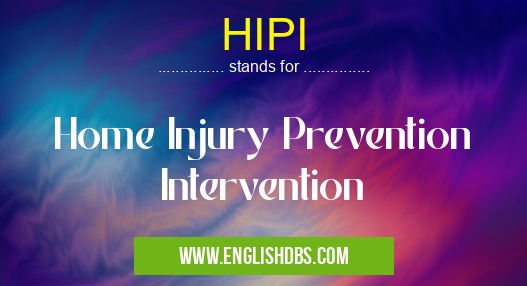What does HIPI mean in PREVENTION
HIPI stands for Home Injury Prevention Intervention. It is a comprehensive program designed to reduce the risk of injuries in the home, particularly among children. HIPI interventions typically involve a combination of safety modifications to the home environment, education for parents and caregivers, and support for implementing safety practices.

HIPI meaning in Prevention in Medical
HIPI mostly used in an acronym Prevention in Category Medical that means Home Injury Prevention Intervention
Shorthand: HIPI,
Full Form: Home Injury Prevention Intervention
For more information of "Home Injury Prevention Intervention", see the section below.
» Medical » Prevention
HIPI Program Components
-
Home Safety Modifications:
- Installing smoke detectors, carbon monoxide detectors, and fire extinguishers
- Securing furniture and appliances to prevent tipping
- Using safety gates to block access to stairs and other hazardous areas
- Covering sharp corners and edges
-
Education for Parents and Caregivers:
- Recognizing potential hazards in the home
- Supervising children closely when necessary
- Teaching children about safety rules and how to avoid accidents
-
Support for Safety Practices:
- Providing guidance and support to parents and caregivers on implementing safety measures
- Offering resources and referrals for additional safety equipment or services
Benefits of HIPI
- Reduced Injury Risk: By addressing common hazards in the home, HIPI interventions can significantly reduce the risk of unintentional injuries, especially among young children.
- Improved Safety Awareness: HIPI educates families about home safety practices, empowering them to make informed decisions and create a safer environment for their loved ones.
- Cost-Effectiveness: HIPI programs are generally cost-effective, as they can prevent injuries that would otherwise require medical treatment and hospitalizations.
Essential Questions and Answers on Home Injury Prevention Intervention in "MEDICAL»PREVENTION"
What is HIPI?
HIPI (Home Injury Prevention Intervention) is a program designed to reduce the risk of injuries occurring within the home environment, particularly among children and seniors.
Who can benefit from HIPI?
HIPI is beneficial for families with young children, elderly individuals, and anyone who wants to create a safer home environment.
What types of injuries does HIPI address?
HIPI focuses on preventing common home injuries such as falls, burns, poisoning, drowning, and suffocation.
How does HIPI work?
HIPI involves a comprehensive approach that includes home safety assessments, education, and the provision of safety devices.
What are the key components of HIPI?
- Home safety assessments to identify potential hazards
- Safety education for families and caregivers
- Installation of safety devices such as smoke detectors, carbon monoxide detectors, and window guards
Is HIPI evidence-based?
Yes, HIPI is supported by research and has been shown to reduce the risk of home injuries.
How can I participate in HIPI?
HIPI programs are typically offered through local public health agencies, hospitals, or community organizations. Contact your local health department for more information.
What are some tips for preventing home injuries?
- Keep floors clean and free of clutter
- Secure loose cords and cables
- Install safety gates at the top and bottom of stairs
- Keep medications and cleaning supplies out of reach of children
- Have smoke detectors and carbon monoxide detectors installed and tested regularly
Final Words: HIPI is a valuable intervention that helps reduce the incidence of home injuries and promotes a safer living environment for families. By implementing safety modifications, educating parents and caregivers, and providing ongoing support, HIPI programs contribute to the well-being and health of communities.
